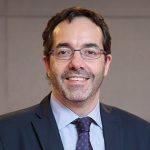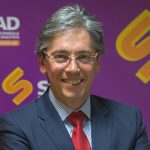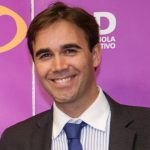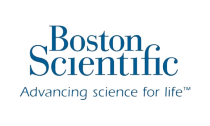Description
Masterclass Program on Endoscopic Ultrasound
Endorsed by:

University Hospital of Santiago de Compostela, Spain
Department of Gastroenterology and Hepatology
Director: Prof. J. Enrique Domínguez-Muñoz
Scientific Rationale
Endoscopic ultrasound (EUS) has evolved in recent years into a technique with a major clinical impact in digestive and mediastinal diseases. In fact, EUS has represented a major advance in the diagnosis and staging of several tumors, and can determine a change in diagnosis and management in 25% to 50% of cases. EUS also provides guidance for fine-needle aspiration of almost all lesions detected during a standard procedure. In addition, several new diagnostic techniques associated with EUS have being developed over the last years, such as EUS guided elastography, contrast-enhanced EUS, and EUS-guided biopsy that are very useful for the differential diagnosis of solid lesions. These techniques are becoming essential in clinical routine. EUS-guided therapy is also increasing in terms of new indications, such as drainage procedures, tumor ablation and injection techniques. Although these procedures are being used in the clinical practice of specialized centers, there is a need for producing research data and increasing the knowledge in these fields.
In line with these scientific and technological developments, there is a clear need for education in EUS and related techniques, and for the adequate positioning of these techniques in clinical practice.
The Department of Gastroenterology and Hepatology of the University Hospital of Santiago de Compostela, Spain, is an internationally recognized and reference center for diagnostic and therapeutic endoscopic ultrasound. In addition, this Department is an international reference center for research and education in this technique.
The Department of Gastroenterology and Hepatology of the University Hospital of Santiago de Compostela, Spain, is organizing Masterclass Programs on Pancreatic Diseases and on Advanced Endoscopic Ultrasound since 2005. These courses are being attended by Gastroenterologists of many different countries all around the world, from Europe, America and Asia.
Prof. Domínguez-Muñoz is an internationally well-known expert in pancreatic function, pancreatic diseases, and pancreatic endoscopy. He is the Chief of the Department of Gastroenterology and Hepatology of the University Hospital of Santiago de Compostela, Spain. Dr. Iglesias-García is an internationally well-known expert in advanced endoscopic ultrasound as well as in pancreatic diseases. He has contributed over the past years with new developments on several novel techniques associated with endoscopic ultrasound, like elastography, contrast-enhancement and endoscopic ultrasound guided biopsy. Dr. Lariño is an internationally expert in endoscopic ultrasound as well as in pancreatic diseases. Dr. Ihab Abdulkader is an internationally well-known expert in cytopathology, mainly in the evaluation of endoscopic ultrasound biopsy samples. He is one of the key opinion leaders in the development of new strategies for the evaluation of biopsy samples obtained by endoscopic ultrasound.
The Department of Gastroenterology and Hepatology of the University Hospital of Santiago de Compostela offers different educational programs to gastroenterologists and GI fellows. The main programs consist on Masterclass educational EUS hands-on programs, and fellowships. These programs are endorsed by the European Society of Gastrointestinal Endoscopy.
Main aims of the program
The present education program consists on theoretical modules and hands-on training. The main aims are:
Theoretical modules (7 hours)
- To provide the appropriate knowledge in endoscopic ultrasound, ranging from basic to specialized concepts.
- To promote the acquisition of knowledge for the adequate EUS-guided diagnosis, management and decision making of different diseases.
- To learn the future trends in the field of endoscopic ultrasound, mainly related to new technologies and therapeutic options.
Practical hands-on modules (20 hours)
- To acquire the skills needed to perform a basic endoscopic ultrasound, identifying anatomical landmarks, with both radial and linear probe.
- To learn the use of advanced imaging technologies, such as elastography and contrast-enhanced endoscopic ultrasound.
- To learn the performance of endoscopic ultrasound-guided tissue acquisition, including the procedure, the selection of the appropriate needle and the sample handling.
- To get insight in advanced therapeutic endoscopic ultrasound.
Content of the theoretical program
Part 1. Theoretical basis of endoscopic ultrasound
- Endoscopic ultrasound systems
- Dedicated material for endoscopic ultrasound
- Organization of an Endoscopic Ultrasound Unit
- Quality Indicators for Endoscopic Ultrasound
Part 2. Diagnostic endoscopic ultrasound
- The EUS technique
- Radial probe
- Linear probe
- Indications for endoscopic ultrasound (based on organs)
- Evaluation of the gut wall (esophageal, gastric, duodenal and rectal indications).
- Pancreatico-biliary indications
- Pancreatic solid and cystic lesions
- Acute and Chronic Pancreatitis
- Biliary diseases
- Mediastinal
- Lung cancer
- Others
- Liver lesions
- Left adrenal gland
Part 3. EUS-guided tissue acquisition
- EUS-guided tissue acquisition techniques
- Cytological and/or histological needles
- Handling of tissue samples
- Formal and accepted indications
Part 4. Advanced imaging technologies associated with endoscopic ultrasound
- Elastography
- Contrast-enhanced endoscopic ultrasound
- Confocal endomicroscopy
Part 5. Endoscopic ultrasound guided therapies
- Celiac plexus neurolisis and blockade
- Drainage techniques
- Collections
- Ductal drainage
- Fine needle injection
Content of Hands-on Program
Hands-on programme is done in patients and models.
About 30 EUS procedures will be performed at the Endoscopic Ultrasound Unit during the course.
Distribution of general indications of the procedures are as follows:
- 70% pancreatico-biliary disease
- 15% gut lesions
- 10% mediastinal lesions
- 5% others
Out of these procedures, advanced imaging is used in about 75% of the cases (elastography and contrast-enhanced endoscopic ultrasound).
Tissue acquisition (FNA/FNB) is performed in about half of these cases.
Number of therapeutic procedures is variable.
According to this data each participant will perform during the Masterclass program about 5 to 10 procedures by himself/herself, guided by expert faculties.
Tissue acquisition techniques and drainage procedures will be learned on models.
Faculty Team
Faculty Team
The Advanced Hands-on Masterclass Program on Endoscopic Ultrasound is supported by:
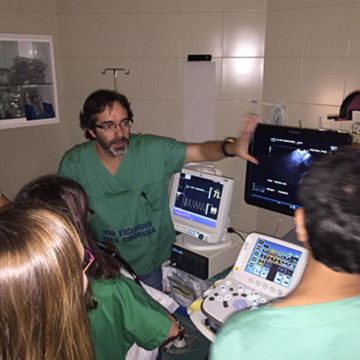
Next Dates
Contact us if none of the planned dates fit you.
Last Dates
2019
- April, 10th-12th
2018
- March, 14th-16th
- April, 16th-18th
- May, 23rd-25th
- October, 3th-5th
- November, 7th-9th
- December 12th-14th
2017
- April, 24th-28th
- May, 19th, Spain
- September, 18th-22th
- November, 13th-17th
Practical Information
Venue:
Endoscopy Unit.
University Hospital of Santiago de Compostela.
C/Choupana, s/n, 15706, Santiago de Compostela, Spain.
Duration
The program is designed to have duration of 27 hours over three days from 8:00h to 18:00h on days 1 and 2, and from 8:00 to 15:00h on day 3.
Number of participants
Each program is designed for six participants.
Registration fee
A pre-registration is required. Registration fee should be paid at registration. This fee includes course expenses, practitioner insurance, coffee breaks, lunches.
Accomodation at a 4* hotel located at walking distance from the hospital can be reserved by the technical secretariat on demand.
Secretariat
Mrs. Paula Otero
info@icedig.info
Tel: +34-981 951 364
Fax: +34-981 955 100
Department of Gastroenterology and Hepatology
University Hospital of Santiago de Compostela
C/Choupana, s/n, 15706, Santiago de Compostela, Spain.




